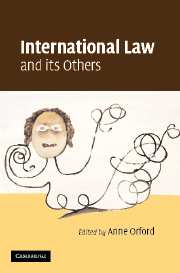Book contents
- Frontmatter
- Contents
- Acknowledgments
- Notes on the contributors
- 1 A jurisprudence of the limit
- PART I Sovereignty otherwise
- PART II Human rights and other values
- PART III The relation to the other
- PART IV History's other actors
- 14 On critique and the other
- 15 Afterword: and forward – there remains so much we do not know
- Index
14 - On critique and the other
Published online by Cambridge University Press: 20 July 2009
- Frontmatter
- Contents
- Acknowledgments
- Notes on the contributors
- 1 A jurisprudence of the limit
- PART I Sovereignty otherwise
- PART II Human rights and other values
- PART III The relation to the other
- PART IV History's other actors
- 14 On critique and the other
- 15 Afterword: and forward – there remains so much we do not know
- Index
Summary
The tragic events of 9/11 have led to a number of challenges to international law and organization. Prominent among these is the Bush Administration pre-emption doctrine, articulated in the US National Security Strategy, that basically proposes that the US can take action, in self-defence, against any ‘emerging threats’. It purports, in effect, to rewrite the laws regulating the use of force: under Article 51 of the Charter of the United Nations, states have an ‘inherent right’ to self-defence, but this is in response to an ‘armed attack’. International lawyers have suggested that an imminent threat of armed attack might suffice to enable a state to respond in self-defence. It would be impractical to require states to experience an actual attack before being able to respond with force. The Bush doctrine, however, clearly goes beyond the situation of an imminent attack, suggesting rather that even an ‘emerging threat’ could justify the use of force in self-defence. A further dimension of the National Security Strategy suggests that the targets of this new doctrine are states that might be characterized as ‘rogue states’ – the most prominent of which are Iraq, Iran and North Korea.
The articulation of this strategy has inevitably caused intense controversy because it represents a radical departure from the existing law on the use of force. Scholars have thus focused on questions such as the relationship between pre-emption and the law of the Charter; how this doctrine can be reconciled with the law of the Charter; and whether the law of the Charter should be interpreted to accommodate this departure in order to meet the new challenges confronting the international community as a consequence of terrorism.
- Type
- Chapter
- Information
- International Law and its Others , pp. 389 - 400Publisher: Cambridge University PressPrint publication year: 2006
- 6
- Cited by



